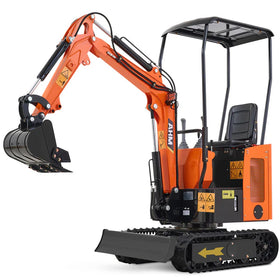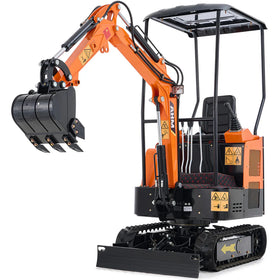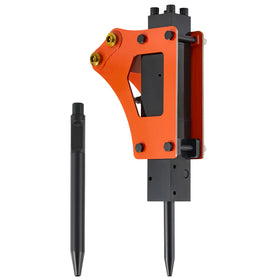In 2024, property developers and homeowners are willing to pay premium rates for professional land clearing services, especially in expanding suburban areas. As there is a growing number of clients who need brush removal for property development or lot preparation for construction, a well-run land clearing business can generate steady profits. Here's your practical guide to entering this growing industry.

1. Choose Your First Land Clearing Equipment
Mini excavators and skid steers form the backbone of modern land clearing operations. For excavators, the 1 to 2.5 ton range serves as versatile foundation machines.
Equipment dealers might push you toward the biggest machines, but successful operators start with versatile gear that matches their initial market. A quality mini excavator or skid steer with essential attachments can help you tackle profitable residential work while building your reputation.
Choosing the wrong machine size can limit your job opportunities - a machine that's too large might prevent you from accessing tight residential spaces, while one that's too small could leave you unable to handle more lucrative commercial clearing projects.
Experienced operators often start with a 1 ton mini excavators because it accesses tight residential spaces while handling substantial clearing work. AHM offers a collection of versatile mini excavators that can handle multiple job types. The AHM 1 ton mini excavator, for instance, equipped with a 13.8 hp Kubota D722 engine and 2698 lbf digging force.
Its 5.7 ft digging depth handles most residential projects while maintaining maneuverability in tight spaces. Start with basic clearing mini excavator attachments and expand your collection as specific job needs arise.
Mini excavators attachments for your land clearing business:
- Brush cutters - 48-inch models match well with 1-2.5 ton machines
- Grapple buckets - Essential for moving brush and logs efficiently
- Hydraulic thumbs - Helps grip and remove stumps
- Standard digging buckets - For soil work and grading
2. How Much Does It Cost to Start a Land Clearing Business

Beyond equipment, your business needs specific legal and insurance coverage to operate legally. You'll need a contractor's license, business registration, and often environmental permits depending on your state. Insurance must cover both general liability and workers' compensation - most clients won't hire uninsured operators. Get quotes from insurance providers who specialize in heavy equipment operations, as standard business policies often exclude land clearing work.
Your primary costs include:
- Equipment insurance and bonding (varies by state and coverage level)
- Business registration and permits (check your local requirements)
- Operating reserve for maintenance and unexpected costs
Let's break down the startup costs with Texas as an example. In Texas, starting a land clearing business requires specific licenses and permits from the Texas Commission on Environmental Quality (TCEQ) and local authorities.
Typical startup costs in Texas include:
Business Registration and Permits
- Business Registration with Secretary of State: $300
- Contractor's License (varies by county): $100-500
- TCEQ Storm Water Permit: $340
- Local Business Operating Permit: $50-200
Insurance Requirements
- General Liability Insurance (minimum $1M coverage): $2,000-5,000 annually
- Workers' Compensation Insurance: $3,000-7,000 annually for 2-3 workers
- Equipment Insurance: 1-3% of equipment value annually
Starting Point Range: $5,800-13,200 (excluding equipment). Before your first job, you'll need about $6,000 in Texas just to operate legally. This covers your basic permits and first month of insurance - costs that surprise many new operators.
This represents just the business setup costs in Texas. Equipment costs vary significantly based on whether you choose new or used, finance or purchase outright. Contact local dealers for current equipment pricing and financing options. Many successful operators start by renting equipment or subcontracting until they build capital for equipment purchases.
3. How to Price Your Land Clearing Services
First you need to understand the land clearing market you want to target. Different regions need different land clearing services. In the U.S, for instance, northern states deal with dense tree cover and rocky terrain, while southern markets might focus more on brush removal and lot preparation. Research your local construction permits - they'll show you exactly what types of clearing work developers need most.
Secondly, land clearing costs vary significantly by region and project scope. Rather than quoting specific prices, contact local land clearing businesses and landscaping companies to understand current market rates in your area. Focus on understanding your operating costs first, then research local competitive rates to set sustainable pricing.
Project Pricing Example:
Most residential brush clearing jobs in Texas average $800-2,000 for quarter-acre lots. A typical project breaks down like this: $400-600 for equipment operation, $150-200 for fuel and maintenance, $100-150 for debris disposal, plus your profit margin. Commercial lot clearing commands $3,000-8,000 per acre depending on vegetation density and terrain complexity. Storm cleanup work, popular among new operators, typically brings $500-1,500 per day.
4. Should I Start With Small Projects?

Yes. Starting with small projects make it easier to build referral networks and lower equipment demands.
Begin with manageable residential projects that build your expertise and reputation. Focus on brush clearing, fence lines, and storm cleanup work. These jobs typically take 1-2 days to complete and let you perfect your technique while maintaining quality.
Most successful operators start with residential brush clearing because these jobs pay quickly and need minimal permits. As you gain experience, gradually take on larger projects that match your equipment's capabilities and your growing skill set.
5. Grow Your Land Clearing Business
As you gain experience with brush removal and basic clearing work, gradually explore light commercial projects. Build relationships with local contractors and maintain detailed records of your operating costs and project outcomes. This data helps you make informed decisions about expanding services or investing in additional equipment.
How to Market Your Land Clearing Business
Today's successful land clearing businesses thrive on modern marketing approaches. Create a professional website showcasing your work through project galleries. Maintain an active Google Business Profile with regular updates and prompt response to reviews. Build relationships with local real estate developers and landscaping companies – they often need reliable clearing services for their clients.
Build a Professional Operation
Modern land clearing demands more than equipment operation skills. Document your projects thoroughly with before and after photos. Invest in basic business management tools for invoicing and scheduling. According to successful operators, maintaining clean equipment and job sites significantly impacts client satisfaction and referral rates.
Choosing Your Business Model
Starting from home saves significant overhead - many successful operators run home-based businesses for years before expanding. You'll need secure equipment storage space and a dedicated area for maintenance, either on your property or through rented yard space ($300-800 monthly). A full operation with a commercial facility demands higher revenue to cover $2,000-4,000 monthly for yard space, office, and covered maintenance areas. Start home-based until your project volume demands expansion.
Conclusion

Starting a land clearing business takes serious planning, but you don't need massive capital to begin. Start with the basics - the right-sized equipment, proper insurance, and enough cash reserve to handle unexpected costs. Many successful operators began with just a mini excavator or skid steer, working residential jobs while building their reputation.
Keep in mind that every region has different demands. Take time to understand your local needs, whether it's brush clearing for suburban developments or lot preparation for rural construction.
Remember these key points for success:
- Choose equipment that matches your target market
- Get proper insurance before your first job
- Start with manageable residential projects
- Document everything with photos
- Build relationships with local contractors
- Keep enough cash reserved for repairs
The land clearing industry rewards operators who deliver consistent, quality work.







